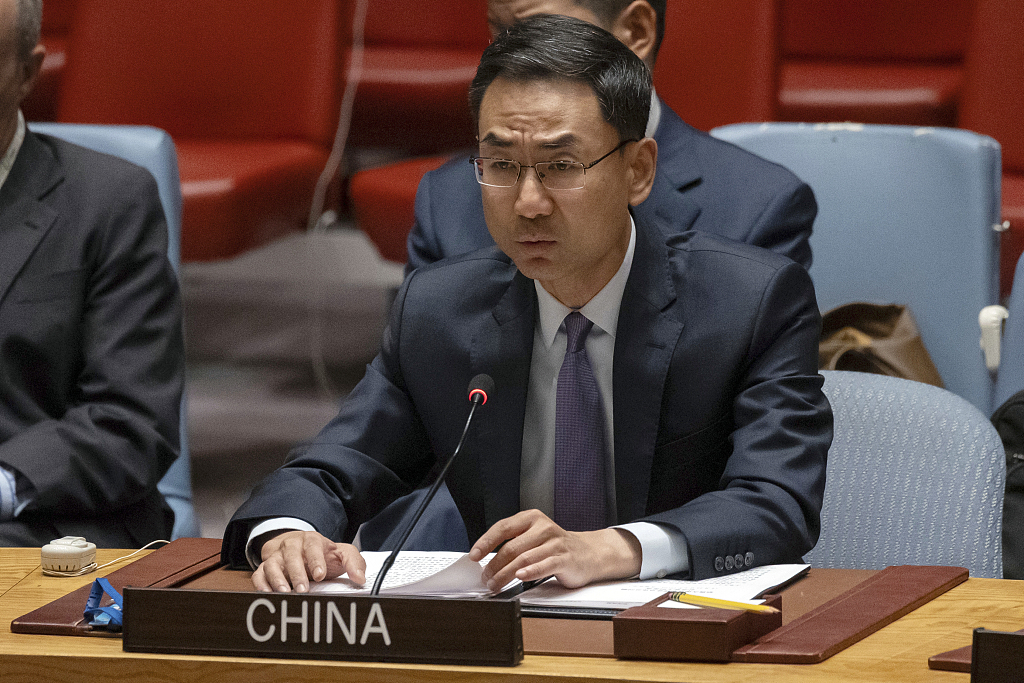A Chinese envoy on Monday called for greater efforts to support the establishment of a nuclear-weapon-free zone in the Middle East.
"Given the current context, the international community should make greater efforts to support the establishment of a Middle East zone free of nuclear weapons and other weapons of mass destruction (WMDs), which is of great urgency and relevance in facilitating reconciliation and cooperation among regional countries in the Middle East and advancing the Middle East peace process," said Geng Shuang, China's deputy permanent representative to the United Nations.
Speaking at the fourth session of the Conference on the Establishment of a Middle East Zone Free of Nuclear Weapons and other Weapons of Mass Destruction, Geng said that nuclear weapons and other WMDs have been "a major factor causing a trust deficit in the Middle East, undermining regional peace and stability."
"China supports the establishment of a Middle East zone free of nuclear weapons and other WMDs and believes that this move will help curb the proliferation of WMDs, safeguard the authority and effectiveness of the international non-proliferation regime, and reduce the risk of an arms race and conflict, thereby providing an important mechanism for the maintenance of long-term regional peace and security," he said.
Geng underscored that China is concerned about flagrant violations of the basic norms governing international relations.
"It pains to see massive civilian casualties on both sides, and it is heart-wrenching to witness the worsening humanitarian crisis in the Gaza Strip. Violence cannot bring true security. The use of force will not create lasting peace," he added.
The ambassador stressed that peace and security in the Middle East "bear on not only the interests of regional states, but also global stability."
"In response to the current global and regional security dilemma, China maintains that the international community should adhere to the concept of common, comprehensive, cooperative and sustainable security, insist on building a balanced, effective and sustainable international security architecture, and adhere to a new path to security that features dialogue over confrontation, partnership over alliances, and win-win over zero-sum," he said.
Geng noted that it is China's wisdom and approach to eliminating the root causes of international conflicts and achieving durable stability and security in the region.
"The Middle East question, with its intertwined historical and practical contradictions, cannot be resolved overnight. It requires all parties to uphold the concept of common security, adhere to the principle of indivisibility of security, and gradually shape a favorable political and diplomatic atmosphere," he said.
"Countries in the region should strengthen their solidarity and coordination and forge mutual trust and consensus. Certain countries outside the region should abandon their narrow geopolitical interests and political manipulation, stop deliberately provoking confrontation in the region, and make practical contributions to the maintenance of regional security," Geng said.
He further said that maintaining the authority and effectiveness of the international nuclear non-proliferation regime is crucial to the establishment of a nuclear-weapon-free zone in the Middle East.
"Recently, what the Israeli officials said about the use of nuclear weapons in the Gaza Strip has caused an uproar. China was shocked by statements of this kind and expressed its concern," he said.
"This kind of statements is universally condemned. It is extremely irresponsible and disturbing. Such statements run counter to the international consensus that a nuclear war cannot be won and must not be fought, are contrary to the international spirit of establishing a Middle East zone free of nuclear weapons, and go against the overwhelming international call to deescalate, cease hostilities and protect civilians," he continued.
Geng urged Israeli officials "to retract these statements" and urged Israel to accede to the treaty on the non-proliferation of nuclear weapons as a non-nuclear weapon state "as soon as possible" and to place all its nuclear facilities under the safeguards of the International Atomic Energy Agency.
Geng noted that China firmly commits to a nuclear strategy of self-defense, adding that "China will continue to practically contribute to the maintenance of peace, security and stability in the Middle East region, and is ready to join others to forge consensus at this conference and to inject new impetus to the establishment of a Middle East zone free of nuclear weapons."


